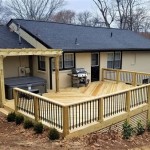Build a Brick Patio on a Sloped Yard: A Comprehensive Guide
Enhancing your outdoor space with a brick patio can be a rewarding endeavor, even if your yard presents a sloping terrain. With careful planning and meticulous execution, you can create a stunning and functional patio that seamlessly integrates with the natural contours of your landscape.
1. Assess the Slope and Plan the Design
Before embarking on your project, carefully assess the slope of your yard. Determine the elevation change across the area and identify any potential drainage issues. Based on this assessment, plan the layout of your patio, considering factors such as the size, shape, and orientation. It's recommended to consult with a professional landscaper or engineer if the slope is significant or if you require specialized drainage solutions.
2. Prepare the Base: Excavation and Leveling
To ensure a stable foundation for your patio, excavation is necessary. Remove any existing vegetation or debris and dig out the area to the desired depth, typically 6-8 inches. Ensure the base is level and compacted to provide a solid and uniform surface for the bricks.
3. Install Drainage and Edging
Proper drainage is crucial to prevent water accumulation and damage to your patio. Install a drainage system, such as a French drain or perforated pipe, along the perimeter or low points of the slope. Edging helps define the boundaries of your patio and prevents bricks from shifting or slipping.
4. Set the Bricks: Dry-Laying and Mortar Setting
Before setting the bricks permanently, engage in dry-laying to visualize the pattern and make necessary adjustments. Once satisfied, remove the bricks and apply mortar to the base. Place the bricks in the desired pattern, starting from the lowest point of the slope and working your way up. Ensure the bricks are level and tightly fitted.
5. Create a Sloped Surface: Layering and Stepped Rows
To accommodate the slope, you can create a tiered effect by layering multiple rows of bricks. Position the first row perpendicular to the slope and subsequently layer additional rows, each slightly offset from the previous one. Alternatively, you can construct stepped rows, creating gentle transitions between different levels.
6. Fill and Grout the Joints
Once the bricks are set, fill the joints with a polymeric sand or mortar mix. This helps stabilize the bricks and prevents weeds from sprouting. Use a grout float to smooth the joints and remove excess material. Allow the grout to cure completely before using the patio.
7. Finishing Touches: Coping and Accents
To complete the patio, install coping around the perimeter, which conceals the exposed brick edges and provides a finished look. You can also add decorative accents, such as planters, benches, or lighting, to enhance the aesthetics and functionality of your outdoor space.
By following these comprehensive steps and incorporating thoughtful design elements, you can successfully build a magnificent brick patio on a sloped yard, creating an inviting and durable outdoor haven that complements the unique contours of your landscape.

Paver Patio Slope

Part 1 How To Build A Paver Patio On Slope And Prevent Soil Erosion

Block Patio Slope Question

How To Improve A Sloped Backyard With Grading And Clay Pavers

How To Make The Most Of Your Sloped Yard Full Circle Land Design

Part 5 How To Build A Paver Patio On Slope And Prevent Soil Erosion 1yr Later

Block Patio Slope Question Doityourself Com Community Forums

How To Install Pavers On A Slope In 10 Steps Unilock

How To Build A Raised Patio Guide By Fantastic

Paver Patio On A Slope Outdoor Living Tip Of The Day
See Also








